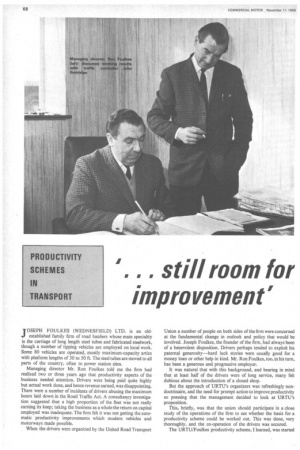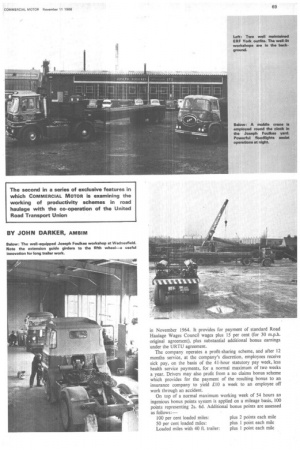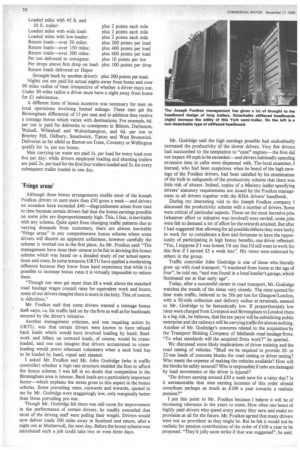. . . still room for improvement'
Page 70

Page 71

Page 72

If you've noticed an error in this article please click here to report it so we can fix it.
JOSEPH FOULKES (WEDNESFIELD) LTD. is an oldestablished family firm of road hauliers whose main speciality is the carriage of long length steel tubes and fabricated steelwork, though a number of tipping vehicles are employed on local work. Some 80 vehicles are operated, mostly maximum-capacity attics with platform lengths of 30 to 50 ft. The steel tubes are moved to all parts of the country, often to power station sites.
Managing director Mr. Ron Foulkes told me the firm had realized two or three years ago that productivity aspects of the business needed attention. Drivers were being paid quite highly but actual work done, and hence revenue earned, was disappointing. There were a number of incidents of drivers abusing the maximum hours laid down in the Road Traffic Act. A consultancy investigation suggested that a high proportion of the fleet was not really earning its keep; taking the business as a whole the return on capital employed was inadequate. The firm felt it was not getting the automatic productivity improvements which modern vehicles and motorways made possible.
When the drivers were organized by the United Road Transport Union a number of people on both sides of the firm were concerned at the fundamental change in outlook and policy that would be involved. Joseph Foulkes, the founder of the firm, had always been of a benevolent disposition. Drivers perhaps tended to exploit his paternal generosity—hard luck stories were usually good for a money loan or other help in kind. Mr. Ron Foulkes, too, in his turn, has been a generous and progressive employer.
It was natural that with this background, and bearing in mind that at least half of the drivers were of long service, many felt dubious about the introduction of a closed shop.
But the approach of URTU's organizers was refreshingly nondoctrinaire, and the need for prompt action to improve productivity so pressing that the management decided to look at URTU's proposition.
This, briefly, was that the union should participate in a close study of the operations of the firm to see whether the basis for a productivity scheme could be worked out. This was done, very thoroughly, and the co-operation of the drivers was secured.
The URTU/Foulkes productivity scheme, I learned, was started in November 1964. It provides for payment of standard Road Haulage Wages Council wages plus 15 per cent (for 30 m.p.h. original agreement), plus substantial additional bonus earnings under the URTU agreement.
The company operates a profit-sharing scheme, and after 12 months service, at the company's discretion, employees receive sick pay, on the basis of the 41-hour statutory pay week, less health service payments, for a normal maximum of two weeks a year. Drivers may also profit from a no claims bonus scheme which provides for the payment of the resulting bonus to an insurance company to yield 110 a week to an employee off work through an accident.
On top of a normal maximum working week of 54 hours an ingenious bonus points system is applied on a mileage basis, 100 points representing 2s. 6d. Additional bonus points are assessed as follows:--
100 per cent loaded miles: plus 2 points each mile
50 per cent loaded miles: plus 1 point each mile Loaded miles with 40 ft. trailer: plus 1 point each mile Loaded miles with 45 ft. and 50 ft. trailer: plus 2 points each mile Loaded miles with wide load: plus 2 points each mile Loaded miles with low-loader: plus 2 points each mile Return loads—over 50 miles: plus 200 points per load Return loads—over 150 miles: plus 400 points per load Return loads—over 300 miles: plus 600 points per load Per ton delivered to consignee: plus 10 points per ton Per drops above first drop on load: plus 100 points per drop Return loads delivered ex Depot (brought back by another driver): plus 200 points per load.
Nights out are paid for actual nights away from home and over 90 miles radius of base irrespective of whether a driver stays out. Under 90 miles radius a driver must have a night away from home for £1 subsistence.
A different form of bonus incentive was necessary for men on local operations involving limited mileage. These men get the Birmingham differential of 15 per cent and in addition they receive a tonnage bonus which varies with destinations. For example, 4d. per ton is paid for deliveries to consignees in Bilston, Darlaston, Walsall, Willenhall and Wolverhampton, and 6d, per ton to Brierley Hill, Oldbury, Smethwick, Tipton and West Bromwich. Deliveries as far afield as Burton-on-Trent, Coventry or Wellington qualify for is. per ton bonus.
Men carrying tar water are paid 5s. per load for every load over five per day; while drivers employed loading and shunting trailers are paid 2s. per load for the first four trailers loaded and 5s. for every subsequent trailer loaded in one day.
'Fringe areas' Although these bonus arrangements enable most of the Joseph Foulkes drivers to earn more than £30 gross a week—and drivers on occasion have exceeded £40—disgruntlement arises from time to time because certain drivers feel that the bonus earnings possible on some jobs are disproportionately high. This, I fear, is inevitable with any scheme. Quite apart from changing traffic patterns due to varying demands from customers, there are almost inevitable "fringe areas" in any comprehensive bonus scheme where some drivers will discern an apparent unfairness, however carefully the scheme is worked out in the first place. As Mr. Foulkes said: "The management have done their utmost to be fair in devising this bonus scheme which was based on a detailed study of our actual operations and costs. In some instances URTU have applied a moderating influence because they know from hard experience that while it is possible to increase bonus rates it is virtually impossible to reduce them.
"Though our men get more than £8 a week above the standard road haulage wages council rates for equivalent work and hours, some of our drivers imagine there is more in the kitty. This, of course, is ridiculous."
Mr. Foulkes said that some drivers wanted a tonnage bonus both ways, i.e. for traffic laid on by the firm as well as for backloads secured by the driver's initiative.
Another management criticism, and one requiring action by URTU, was that certain drivers were known to have refused back loads which would have involved loading by hand. Steelwork and billets on outward loads, of course, would be craneloaded, and one can imagine that drivers accustomed to craneloading would prove reluctant volunteers when a sack load has to be loaded by hand, roped and sheeted.
I asked Mr. Foulkes and Mr. John Godridge (who is traffic controller) whether a high rate structure enabled the firm to afford the bonus scheme. I was left in no doubt that competition in the Birmingham area is intense. Back loads are a particularly important factor—which explains the stress given to this aspect in the bonus scheme. Some prevailing rates, outwards and inwards, quoted to me by Mr. Godridge were staggeringly low, only marginally better than those prevailing pre-war.
Though Mr. Godridge felt there was still room for improvement in the performance of certain drivers, he readily conceded that most of the driving staff were pulling their weight. Drivers would now deliver loads 300 miles away in Scotland and return, after a night out at Motherwell, the next day. Before the bonus scheme was introduced such a job could take two or even three days. Mr. Godridge said the high earnings possible had undoubtedly increased the productivity of the slower drivers. Very few drivers had succumbed to the temptation to "cane" engines—the firm did not expect 40 mph to be exceeded—and drivers habitually spending excessive time in cafes were dispensed with. The local examiner, I learned, who had been suspicious when he heard of the high earnings of the Foulkes drivers, had been satisfied by his examination of the built-in safeguards of the productivity scheme that there was little risk of abuses. Indeed, copies of a Ministry leaflet specifying drivers' statutory requirements are issued by the Foulkes management to all drivers together with the RHA drivers' handbook.
During my interesting visit to the Joseph Foulkes company I discussed the productivity scheme with a number of drivers. Some were critical of particular aspects. Those on the most lucrative jobs (whatever effort or initiative was involved) were envied; some jobs were felt to demand a lot of effort for the rewards attained. But after I had suggested that allowing for all possible defects they were lucky to work for so considerate a firm and fortunate to have the opportunity of participating in high bonus benefits, one driver reflected: "Yes, I suppose if I was honest I'd say that I'd still want to work for this firm if I earned £5 a week less". His views were endorsed by others in the group.
Traffic controller John Godridge is one of those who literally grew up with road transport. "I wandered from home at the age of four", he told me, "and was found in a local haulier's garage, which fascinated me at that early age".
Today, after a successful career in road transport, Mr. Godridge watches the trends of the times very closely. The rates quoted for liner train traffic, believed to be 50s per ton for Glasgow/London, with a 50-mile collection and delivery radius at terminals, seemed to Mr. Godridge to be fantastically low. If proportionately low rates were charged from Liverpool and Birmingham to London there is a big risk, he believes, that the tax-payer will be subsidizing public enterprise and the railways will be carrying traffic for almost nothing. Another of Mr. Godridge's concerns related to the acquisition by the Transport Holding Company of Midlands road haulage firms. "To what standards will the acquired firms work?" he queried.
We discussed some likely implications of driver training and the road testing of vehicles. "Shall we be required to provide 20or 22-ton loads of concrete blocks for road testing or driver testing? Who meets the expense of making the vehicles available? How will the blocks be safely secured? Who is responsible if cabs are damaged by load movements or the driver is injured?
"Do drivers earning around £30 a week save for a rainy day? Is it unreasonable that men earning incomes of this order should contribute perhaps as much as £100 a year towards a realistic pension?"
I put this point to Mr. Foulkes because I believe it will be of increasing relevance in the years to come. How often one hears of highly paid drivers who spend every penny they earn and make no provision at all for the future. Mr. Foulkes agreed that many drivers were not as provident as they might be. But he felt it would not be realistic for pension contributions of the order of £100 a year to be proposed. "They'd jolly soon strike if that was suggested", he said.
































































































































